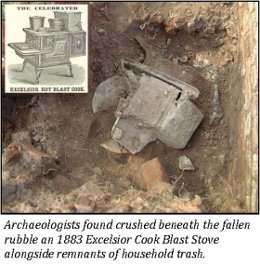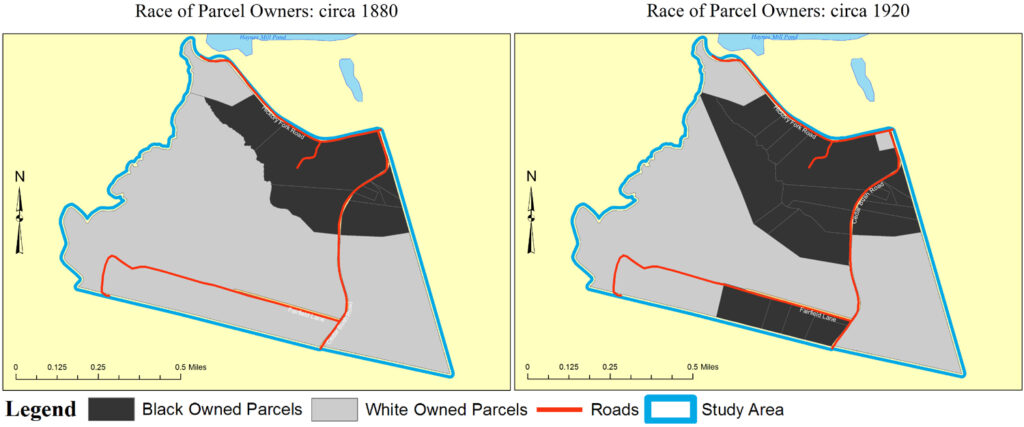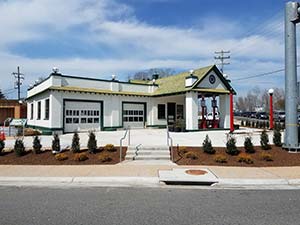 “Struggle, achievement, strife and reward are words that define the growth of African-American communities in late 19th-century Gloucester County Virginia.” This is the first sentence in our booklet “Fairfield Plantation and the Emergence of an African-American Community” (2009) (Fairfield Plantation and the Emergence of an African-American Community) and it barely scratches the surface of what these communities endured and accomplished after the Civil War and during the early 20th century. Many of us are familiar with the history of Gloucester’s magnificent brick manor homes and plantations, its essential part in the victory at Yorktown during the Revolutionary War, and its direct link with Pocahontas and Powhatan at Werowocomoco, but our shared heritage also includes the stories of the first generation of freedom – the African-American families that survived slavery and made a world for themselves after emancipation. At Fairfield, this history survives in the historic documents, the archaeological record, and the descendant community still living in the neighborhoods their ancestors created.
“Struggle, achievement, strife and reward are words that define the growth of African-American communities in late 19th-century Gloucester County Virginia.” This is the first sentence in our booklet “Fairfield Plantation and the Emergence of an African-American Community” (2009) (Fairfield Plantation and the Emergence of an African-American Community) and it barely scratches the surface of what these communities endured and accomplished after the Civil War and during the early 20th century. Many of us are familiar with the history of Gloucester’s magnificent brick manor homes and plantations, its essential part in the victory at Yorktown during the Revolutionary War, and its direct link with Pocahontas and Powhatan at Werowocomoco, but our shared heritage also includes the stories of the first generation of freedom – the African-American families that survived slavery and made a world for themselves after emancipation. At Fairfield, this history survives in the historic documents, the archaeological record, and the descendant community still living in the neighborhoods their ancestors created.
 The final resident of the Fairfield manor house was an African-American woman, likely once a slave, who rented the building or served as a tenant farmer on the property, then known as Carter Creek Farm. It is her everyday goods that we recover during our excavations of the house and we have learned as much about her life as we have the better known Burwell and Thruston families who lived there before her. Our booklet uses the study of these artifacts, and an in-depth analysis of the land ownership in this area, as a starting point for discussing the history of this unnamed woman and her neighbors from 1865 through the early decades of the 20th century. Through hard work and determination, they built schools and churches, worked at the local mill at Haynes Mill Pond and the store at Clopton, and pulled together to purchase property and build a community.
The final resident of the Fairfield manor house was an African-American woman, likely once a slave, who rented the building or served as a tenant farmer on the property, then known as Carter Creek Farm. It is her everyday goods that we recover during our excavations of the house and we have learned as much about her life as we have the better known Burwell and Thruston families who lived there before her. Our booklet uses the study of these artifacts, and an in-depth analysis of the land ownership in this area, as a starting point for discussing the history of this unnamed woman and her neighbors from 1865 through the early decades of the 20th century. Through hard work and determination, they built schools and churches, worked at the local mill at Haynes Mill Pond and the store at Clopton, and pulled together to purchase property and build a community.
The booklet, funded by Virginia Humanities, is an early step in our research and outreach with the current residents and descendant community. It is a small part of the much larger story of African-American life in Gloucester County, and we hope that it helps provoke discussion and encourages further collaboration with those interested in studying this period and people. If you want to teach us about your family’s history, have memories or documents to share, and want to help encourage the better understanding of our community’s heritage, please contact us. We are more than happy to work alongside you to preserve the stories, knowledge, and places of the past for future generations.
The image below is one example of the type of information we are starting to pull together to learn more about the community around Fairfield. There were many communities like this across the county, but very few have been documented or studied. We have much more to learn. Please contact us and help connect the dots of history.



Great booklet! I love that the house was occupied by an African American tenant. A house in Southampton I was working on this winter that had fallen into disrepair had also been occupied by an African American family during the 20th century. I’m also fascinated that parts of the plantation were sold off to African American laborers. In the deeper south, plantations were broken into sharecropping or tenant farms. Is this a pattern that is regularly visible in Virginia, or unique to Fairfield?
TC Walker parents worked at the Fairfield after they were no longer slaves. TC WALKER who was born into slavery was one yr old when freed he became a lawyer and encouraged black ppl to buy land in Gloucester County.
TC Walker parents worked at the Fairfield after they were freed and no longer slaves. TC WALKER who was born into slavery was one yrs. old when freed, he later became a lawyer and encouraged black ppl to buy land in Gloucester County.
Really fascinating. The Fairfield Foundation is doing important work for Gloucester and Virginia. Thank you and best wishes.
I have been reading the life story of Thomas Calhoun Walker, “The Honey-pod Tree.”
What a fascinating man he was. He was born into slavery and later became a government official in charge of Negro affairs. At the age of 13 he was unable to read or write. He gathered together 92 cents, ran away from home and walked 14 miles to the ferry and made it to Hampton Institute, where he graduated and later became an attorney. “He was a combination of realist and idealist who from the time he got his education until the time of his death never ceased practical, sensible work” for his people.
We agree, T.C. Walker led a fascinating life, and left an important legacy. We are also very happy with the new mural commemorating his life on Main Street. It’s a great American story.